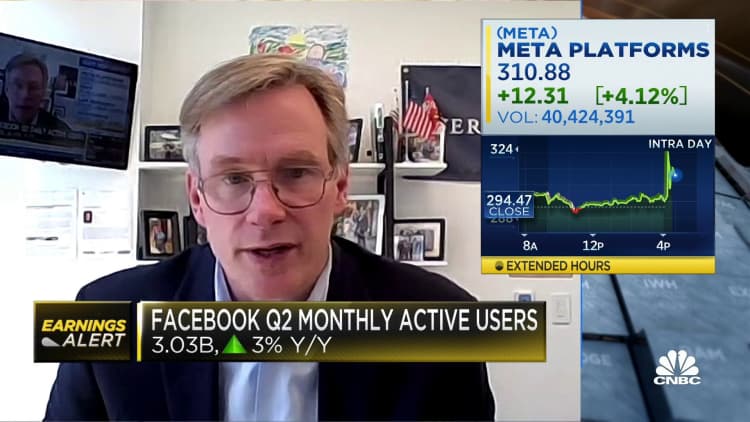Meta CEO Mark Zuckerberg demonstrates an Oculus Rift virtual reality (VR) headset and Oculus Touch controllers during the Oculus Connect 3 event in San Jose, California, U.S., on Thursday, Oct. 6, 2016.
David Paul Morris | Bloomberg | Getty Images
Meta CEO Mark Zuckerberg is once again a fan favorite on Wall Street. The same can’t be said for Snap CEO Evan Spiegel.
Both companies were hammered by Apple’s iOS privacy change in late 2021 and the broader economic tumult last year, spotlighted by soaring inflation, rising interest rates and the war in Ukraine. Their ad businesses shrank and investors bailed. Mass layoffs ensued.
But in consecutive days this week the stark contrast between the two companies has become more clear than ever. Snap shares sank 14% on Wednesday after issuing a disappointing forecast the prior afternoon. Meta’s stock jumped almost 7% in extended trading on Wednesday following better-than-expected results, a return to double-digit growth and rosy guidance for the third quarter.
Meta shares are now up more than 160% for the year. Snap is up 20%, about inline with the S&P 500.
Neither Zuckerberg nor Spiegel have plans to cut back on spending money on experimental projects. Meta is burning billions of dollars a quarter on the futuristic metaverse, and Snap is pouring cash into augmented reality products and services. Both are heavily touting the benefits of artificial intelligence.
The difference is that Meta has rightsized its finances. While Snap’s revenue dropped 4% in the second quarter, Meta is solidly growing again, driven by Facebook’s ad business.

Meta Chief Financial Officer Susan Li told analysts on the company’s earnings call that advertising revenue rose in part due to an increase in spending by online retailers and Chinese companies, continuing a trend from the previous quarter.
Li also said online advertisers are adopting Meta’s Advantage+ service, which analysts have said is helping the company improve the effectiveness of its ad system following the iOS privacy change.
“We’re seeing this work translate into results for advertisers as conversion growth remains strong in Q2,” Li said.
Even with the ad rebound, analysts questioned Zuckerberg on the earnings call about the business rationale for investing in the metaverse, and expressed concern about growing losses in the company’s Reality Labs unit.
Zuckerberg’s pitch for the company’s metaverse investment — which inspired the name change to Meta in 2021 — continues to center around the idea that the company needs to own a platform. Apple has iOS, Google has Android and Facebook has always been forced to play by their rules in order to get distribution for its apps, which include Instagram and WhatsApp.
The metaverse is the place where Zuckerberg sees that dynamic changing. However, he has said it could take a decade and told analysts on Wednesday that he “can’t guarantee you that I’m going to be right about this bet.”
“I do think that this is the direction that the world is going in,” Zuckerberg said. “One billion or two billion people have glasses today; I think in the future, they’re all going to be smart glasses.”
Meanwhile, Spiegel pitched Snap’s AR projects as a “long-term focused” investment that represents “an extension of our core platform rather than totally new bets.”
An analyst on Tuesday asked Spiegel whether the company has “a lot of employees that are working on like five-plus year projects that are not generating revenue,” underscoring the general concern that Snap is spending too much time and investment on the future rather than resolving immediate financial concerns.
And while Meta has seemingly fixed most of its ad problems, Snap is still struggling.
“Profitability is being particularly impacted by a major step up in infrastructure spending as Snap invests in AI both to enhance the user experience and also attempt to improve ad targeting capabilities,” wrote James Cordwell, an analyst at Atlantic Equities, in a note to clients. As a “subscale platform,” Cordwell said he’s skeptical of Snap’s ability to succeed in those areas while “still delivering attractive returns to investors.”
